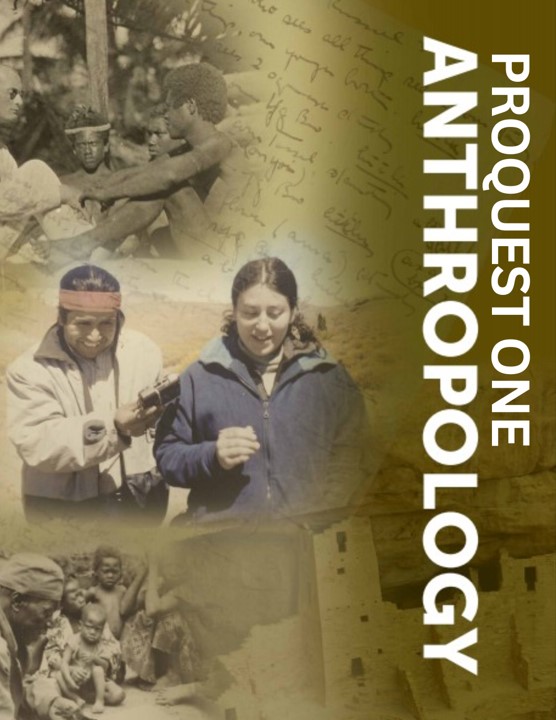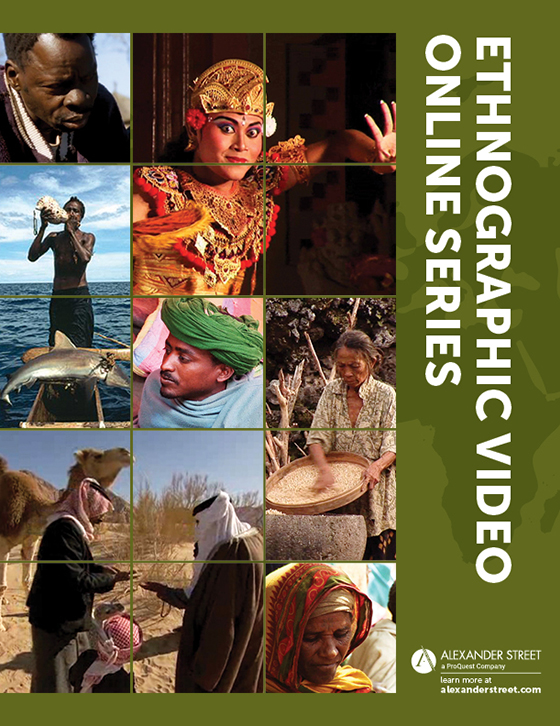
ProQuest One Anthropology
The largest collection of ethnographic primary sources supporting students’ firsthand engagement with human diversity around the world. ProQuest One Anthropology contains field notes, draft manuscripts and published ethnographies from key scholars, enabling students to trace the full scholarly process in all of its iterations, from data gathered in the field to later analyses, drafts and publications.
Resources work in tandem to bring the fieldwork process to life by juxtaposing original fieldwork with subsequent published ethnographies, as well as follow up studies and visual ethnographies that span a century.
ProQuest One Anthropology provides a wide range of digital resources for the study of anthropology, including archives, manuscripts, video, and audio, which encompass foundational ethnographic research, historical field recordings, and visual anthropology materials. These resources are carefully curated to support both academic research and classroom learning.
Archive and Manuscript Collections
- Archive and Manuscript Collections provide essential fieldwork materials, preserving significant research and making it accessible for modern study.
Anthropological Fieldwork Online
Contemporary Anthropology: Archaeological Fieldwork and Methods
This collection grants access to materials relating to archaeological excavations, methods, and practices done in the late 20th century to present day. It provides insights into the lives, cultures, and societies of ancient and not-so-distant civilizations through the analysis of material remains and artifacts from the past. Learn More.
Printed Works Collections
- Printed Works combine classic and contemporary ethnographic texts, offering comprehensive studies and key publications in the field.
Anthropology Online
Anthropology Online brings together a wide range of written ethnographies, seminal texts and contemporary studies, many of which are the final published works resulting from the research digitized in Anthropological Fieldwork Online. Learn more.
Video Collections
- Video Resources offer visual anthropology content, including ethnographic films, field footage, and documentaries that are crucial for understanding cultural practices and communities.
Ethnographic Video Online Series (New Volume Coming in 2026!)
Alexander Street is the most comprehensive resource for visual anthropology in the world, providing access to over 2,000 hours of film and always growing, from raw field footage to crafted ethnographies and documentaries. Available in any current model popular today for acquiring video, from single titles, to PDA, to curated collections, these offerings provide core visual materials for anthropology courses of all levels. Learn more.
Audio Collections
- Audio Resources include rare field recordings and ethnographic sound archives, providing rich, historical perspectives on music and culture.
Ethnographic Sound Archives Online
Ethnographic Sound Archives Online brings together previously unpublished historic audio recordings and their supporting field materials, opening new paths for the study of music in its cultural context. The collection brings together 2,000 hours of audio recordings from field expeditions around the world, particularly from the 1960s through the 1980s—the dawn of ethnomusicology as a codified discipline. Learn more.
Alexander Street brings unique functionality to this material. Deep indexing lets users search and browse by cultural group, place, subject, and ethnographer, optimizing visibility for all material. Users can also search video transcripts to locate specific cultural groups, rituals, traditions, or case studies and watch relevant material within seconds, or pour through thousands of pages of archival content to learn how anthropology’s biggest names did their work. For example, users can read Bronislaw Malinowski’s original field notebooks alongside his published ethnographies, and find follow-up studies and visual ethnographies from his Trobriand Islands field site created a century later.
Teaching Support
- Teaching Support is integrated into video collections, offering curriculum-aligned materials and resources designed to aid the teaching of anthropology concepts such as cultural identity and belief systems.
Ethnographic Video Online, Royal Anthropological Institute Teaching Edition
A curriculum-aligned collection of videos and segments curated to support the teaching of introductory anthropology courses. Each video and segment within this collection are accompanied by a teaching guide providing background information, lesson plans, and classroom exercises and activities. There are a variety of themes that are discussed including family and kinship, gender roles, cultural identity, belief systems and other topics centered around diversity, change, and culture. All teaching materials within this collection are created by the Education Committee of the Royal Anthropological Institute.
How do these resources work together to support teaching and research?
Use Case: Link original field notes ot their final, published ethnographies
Unique Content
- First time, exclusive publication of original fieldnotes from the most important anthropologists of all time - Margaret Mead, Bronislaw Malinowski, Victor Turner, Ruth Benedict, Max Gluckman, and more
- Inclusion of indigenous perspectives that break down “us versus them” dichotomies
- Ethnographic films representing traditional practices from over 1,000 cultural groups
Content Examples
- Listen to traditional music from a street market in Afghanistan, recorded by ethnomusicologist Mark Slobin a few months before the anti-music Taliban takeover
- Track the origin of Victor Turner’s liminality theory in fieldnotes from Mukanda rituals, which transformed understanding of adolescent transitions to adulthood
- Read original correspondence between Margaret Mead and Claude Lévi-Strauss
Teaching Power
- Find films and text illustrating key syllabi topics like kinship, subsistence, gender, ritual
- Introduce students to fieldwork methods with real-life examples
- Teach longitudinal studies of cultures over time
- Link ethnographic texts to original fieldnotes
Content Partners
- London School of Economics
- Yale University
- The Center for Ethnomusicology at Columbia University
- Pitt Rivers Museum
- Royal Anthropological Institute
- National Anthropological Archive
- National Library of New Zealand
- Berkeley Media
- Granada Centre fo Visual Anthropology
- Advanced Laboratory for Visual Anthropology
- American Philosophical Association
Note: In 2025, Anthropology Resource Library was renamed to ProQuest One Anthropology to unify and elevate discipline-specific content under the ProQuest One brand.







